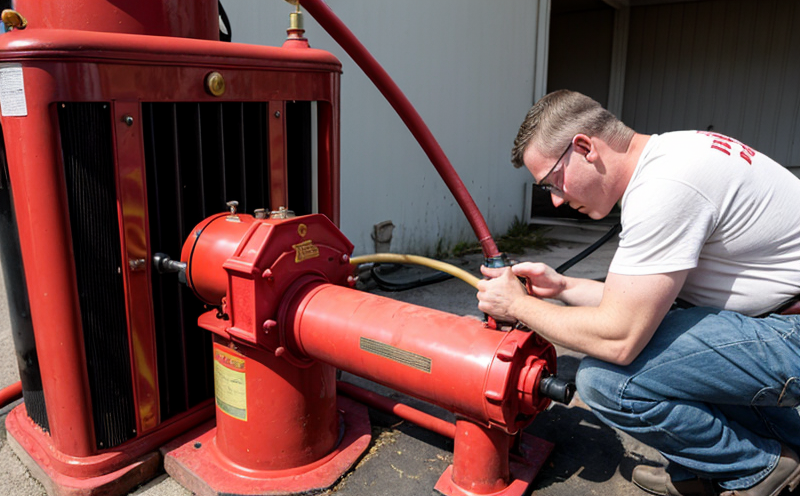Fire pump inspection
The fire pump is a critical component in any fire protection system, playing an indispensable role in providing water to firefighting equipment. A thorough inspection of fire pumps ensures their reliability and readiness during emergencies. This service encompasses the evaluation of both the mechanical and operational performance of fire pumps as per international standards such as NFPA 20, ISO 13869, and ASME PTC 19.5.
The primary objective is to verify that all components function correctly under specified conditions. This includes assessing the pump's capacity to deliver water at required pressures and flow rates, checking for leaks, ensuring proper lubrication systems are in place, and verifying the integrity of electrical connections. The inspection also covers the integrity of the fire pump house, including ventilation, drainage, and access.
Fire pumps must be capable of providing water pressure within a specified range to ensure that firefighters can operate their equipment effectively. This involves ensuring that the pump can achieve the required flow rates at various pressures, which are critical for firefighting operations. The inspection process typically includes reviewing maintenance records, conducting visual inspections, and performing operational tests.
During an operational test, fire pumps must be run continuously for a specified duration to evaluate their performance under real-world conditions. This helps identify any potential issues that could arise during actual use. Additionally, the integrity of the pump's control panel is checked to ensure it operates correctly in both manual and automatic modes.
The inspection also includes checking for any signs of wear and tear on key components such as impellers, shaft seals, and bearings. The condition of these parts directly affects the pump’s performance and longevity. Regular inspections help identify early signs of deterioration, allowing for timely maintenance or replacement to prevent failures during critical times.
Another crucial aspect is ensuring that the fire pump complies with all relevant codes and standards. This includes verifying that the pump's electrical wiring meets safety requirements and that it is properly grounded. The integrity of the supply lines must also be assessed, including checking for any signs of corrosion or damage.
The inspection process also involves evaluating the pump’s ability to handle various fluids, such as water and foam solutions, which are commonly used in firefighting operations. This ensures that the pump can deliver the correct mixture at the required pressure and flow rate. The use of different fluids highlights the importance of understanding how these variables affect overall performance.
Moreover, fire pumps must be capable of operating under varying environmental conditions, including temperature extremes and humidity levels. The inspection process assesses how well the pump performs in these environments to ensure it remains reliable during emergencies. This involves evaluating the pump's ability to start and operate smoothly even in challenging conditions.
In summary, a comprehensive fire pump inspection is essential for ensuring that this critical component of a fire protection system functions as intended. By adhering to strict standards and performing regular inspections, we can identify potential issues early on, ensuring maximum reliability when it matters most.
International Acceptance and Recognition
- The inspection of fire pumps adheres to international standards, including NFPA 20 in North America, ISO 13869 for Europe, and ASME PTC 19.5 in other regions.
- Fires pumps that meet these standards are recognized globally, ensuring consistent performance and reliability across different markets.
Environmental and Sustainability Contributions
The inspection of fire pumps plays a vital role in environmental sustainability by ensuring that these critical components operate efficiently. By maintaining the pump’s optimal condition, less water is wasted during testing and operation. This contributes to overall water conservation efforts.
In addition, regular inspections help prevent failures that could lead to unnecessary water loss or contamination. Ensuring that fire pumps are reliable also reduces the need for replacement parts, contributing to waste reduction. Moreover, by adhering to strict standards, we promote a culture of environmental responsibility within the industry.
Competitive Advantage and Market Impact
A comprehensive inspection of fire pumps not only ensures compliance with regulations but also provides a competitive advantage in the marketplace. By demonstrating that your facility adheres to strict standards, you can build trust with clients and stakeholders. This is particularly important for businesses operating in industries such as healthcare, manufacturing, and public safety.
Furthermore, regular inspections help identify potential issues early on, allowing for timely maintenance or repairs before they escalate into more significant problems. This proactive approach enhances the overall reliability of your fire protection system, reducing downtime and ensuring that it is always ready when needed most.





